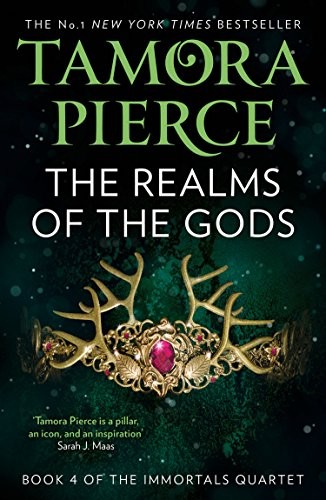Books That Burn reviewed Realms of the Gods by Tamora Pierce
Review of 'Realms of the Gods' on 'Storygraph'
3 stars
The plot follows Daine and Numair almost dying before being transported to the Divine Realms, where Daine meets her father and sees her mother again. They find out that Chaos is helping Ozorne or someone in his army, and set out across various sections of the Divine Realms to see if Skysong’s dragon relatives will transport them back home so they can help in the war. Along the way, Daine and Numair end up acknowledging their love for each other and start to figure out the next steps in their relationship.
I hadn’t read this in a long time, and I’d forgotten that Daine isn’t yet an adult here. She’s sixteen to Numair’s thirty. Numair is completely aware that to pursue Daine romantically and/or sexually, due to their relationship as teacher and student and the fact that he’s almost twice her age, is likely to be unequal and mean he’s …
The plot follows Daine and Numair almost dying before being transported to the Divine Realms, where Daine meets her father and sees her mother again. They find out that Chaos is helping Ozorne or someone in his army, and set out across various sections of the Divine Realms to see if Skysong’s dragon relatives will transport them back home so they can help in the war. Along the way, Daine and Numair end up acknowledging their love for each other and start to figure out the next steps in their relationship.
I hadn’t read this in a long time, and I’d forgotten that Daine isn’t yet an adult here. She’s sixteen to Numair’s thirty. Numair is completely aware that to pursue Daine romantically and/or sexually, due to their relationship as teacher and student and the fact that he’s almost twice her age, is likely to be unequal and mean he’s taking advantage of her trust and inexperience, even if he doesn’t intend it. After they kiss he has a short speech this effect. That sets up the idea that normally this would be a problem, but the fact that they do end up together throughout the rest of the book means that their relationship is treated as an exception to the general rule. It makes the this plot arc feel like grooming on Numair’s part, or at least not taking the necessary actions in support of his knowledge that he’s in a massive position of power over a literal child. No matter how much Numair does not want to be that kind of manipulative person as an idea, he ends up perfectly fine with continuing to pursue this relationship once Daine insists that she loves him and knows what she’s doing. I like a lot of their actual dynamic in ordinary scenes, but even if she was twenty or twenty-five when he’s thirty then there’s still the problem that he’s her magic teacher. Because of how the characters are written, things work out and he’s not screwing her over, but if he were a slightly shittier person she’d have a lot of trouble getting help or getting away.
As the final book in the quartet, this wraps up the fate of former emperor Ozorne and addresses the gods’ perspective on the former barrier between the Mortal Realm and the Divine Realms. We finally meet Skysong’s family and answer whether they’re fine with her remaining in Daine’s care. It also puts words to the attraction between Daine and Numair which has been subtly (and occasionally not-so-subtly) teased in the earlier books. At long last Daine meets her father, as well as finding out where her ma went after she died. This introduces and resolves Daine and Numair being transported to the Divine Realms. It’s the final book of the quartet but there clearly were plans for more Tortall books, so this leaves open whether or not Daine and Numair will stay together and maybe get married.
It would not make sense to start here, as the point of this is to address things left open from previous books. Even something as simple as Daine’s parentage has been slowly teased for three previous books, so getting the answer almost immediately in this one would feel anticlimactic to anyone who hasn’t read the others.
This will either not feel like a lore dump at all, or feel like a stack of lore packets in a trench coat. Almost every moment is designed to show off something about the setting, the Gods, or various immortals. It’s so embedded in the story that it’s inescapable but manages to feel seamless for long stretches so it’s usually not bothersome. For a tour of the Divine realms it’s pretty cool. I’m a little thrown by the decision to make the Platypus god say “G’Day” like a cartoon of an Australian. Overall it's an interesting but ultimately skippable end to the quartet.

